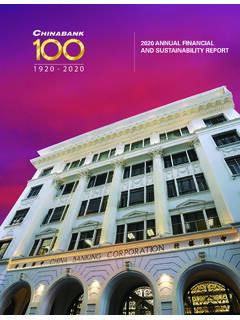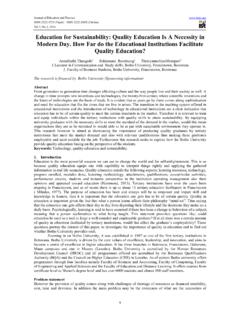Transcription of Children’s Literature as an Important Tool for Education ...
1 International Electronic Journal of Environmental Education Vol. 2, Issue 1, Jan 2012 ISSN: 2146-0329 Copyright International Electronic Journal of Environmental Education Children s Literature as an Important Tool for Education of sustainability and the Environment Lea BARATZ Achva-college of Education , Israel Hanna Abu HAZEIRA Achva-college of Education , Israel Received: July, 2011; Revised: November, 2011; Accepted: December, 2011 Introduction Nature is the art of God (Sir Thomas Browne) Nature to be commanded must be obeyed (Francis Bacon) There is no forgiveness in nature (Ugo Betti) The ecological crises/disasters which have befallen the world have created an increasing awareness of sustainability in institution in Israel such as the Ministry for Protection of the Environment and others such as the Standards Institute, the army, voluntary organizations.
2 Lea Baratz, 12 Avner Ben Ner, Ness Ziona, Israel. E-Mail: Abstract Children s Literature is operated and distributed on the basis of faith, whereby if there is a place for effective links between Literature and society, then it will naturally be found first in children s Literature . For the most part children s Literature is goal directed and amongst its targets is the assimilation of socio-cultural values. The number of study hours for children s Literature in the colleges for Education is very limited, and only infrequently is the educator of the future awarded broad knowledge of children s Literature during her studies at the college. Currently no study program has been designated for the connection between children s Literature and sustainability and its derivatives and a method of integrating this subject into the field of Literature .
3 Due to the importance of children s Literature in the assimilation of values and instilling of an ideological infrastructure which will become a way of life, it is appropriate to examine the findings of literary works in Literature textbooks and before this the outline of the subject in the syllabus. One should introduce environmental studies into existing subjects and introduce environmental studies as a new subject in the syllabus. Key words: Children s Literature , Education of sustainability , Education of environment, children s Literature as a means of socializing Children s Literature as an Important Tool for Education for sustainability 32 In spite of the recognition by Ministry of Education and for Protection of the Environment urgent need to set up a working program for implementation of issues regarding the quality of the environment into the educational system.
4 Environmental Education is still not perceived as a potential subject in the school curricula. An organizing foundation which requires an innovative school model for its application is needed. Under the heading of ecology one can count 76 children s books. In particular one should note the work of Ran Levy Yamouri, which is dedicated to promoting books with an ecological orientation, some of which are written bilingually, Hebrew-Arabic. Together with the growing awareness about sustainability the question still remains: How can this subject be integrated into Literature studies in teachers training? Currently no study program has been designated for the connection between children s Literature and sustainability and its derivatives and a method of integrating this subject into the field of Literature . The term ecology is one of the most focal terms in the political, social and cultural, educational and philosophical discourse in current times.
5 The environmental debate (or ecological in the broad sense of the term) has intensified based on the fear of a man-made ecological holocaust. The environmental debate including its many derivatives is a fire in the belly of current global culture: for several the call for a green environment, for protection of nature and sustainability is a central issue in a culture observing its self-destruction, and for others this is no more than a passing fashion statement (Hotem, 2010). We wish to examine the importance of children s books dealing with nature and ecology, and whether their availability on the shelf is an action that should mediated by adults. This follows the political, educational and cultural debate between scientific approaches which aspire to discuss the preservation of nature, solely and only in functional contexts of the ecosystem and cultural approaches which adopt a normative approach as regards the protection of nature, an approach that combines social interest, aesthetic sensitivity, historical awareness and ethical judgment of man as a scenic mould of his native land (Hotem, 2010).
6 In this paper I wish to express the voice of teaching as a tool; the belief in the foundation of the next generation of agents of socialism. I wish to demonstrate how an available tool, which is also effective, can illuminate the debate in the teaching process from all its aspects. The Outline of Educational Policies on the Issue of Quality of the Environment The policy of the Ministry of Education is to deal with the subject of the quality of the environment and the subject of ecology and sustainability in general; the field of Literature in particular is located within the general program. I wish to focus on books that have been written for children with the understanding that Literature is an impetus for assimilation of social ethics. Therefore, it is appropriate to examine the findings of books dealing with nature conservation, particularly in the light of the memorandum which was submitted to the Education Committee (2006) and in the light of data recorded by Court and Rosenthal (2006) as regards the small number of literary works dealing with the subject of quality of the environment in school textbooks.
7 In her study she notes love of nature and conservation of the environment as leading values. The value of the love of the people and the country appeared in of responses relating to the Important values in textbooks. In one sentence the writer summarizes the value of love of nature and the value of preservation of the environment : This value reinforces the understanding of the importance of the love of nature for mankind, the need for environmental conservation and the love of animals (Court & Rosental, 2007, p. 28). However, the disparity between the treatment of it and reading about it in textbooks should be examined. As the syllabi constitute the consolidation of the knowledge, skills and beliefs that a certain society sees appropriate to expose to the generation of students, and the methods of implementing them within diverse educational frameworks that the society establishes and makes available to the student (Alpert, 2002, p.)
8 Leah Baratz & Hanna Abu Hazeira 33 28), the issue of children s Literature as an additional tool in the overall process should be examined. Also as the syllabus programming is a series of actions during which selections are made, allocations, creation and evaluation of educational outcomes and the means of achieving them, in the light of the forecast of social desires (Schremer & Bailey, 2001). Rosenthal notes that it is possible to construct the syllabus according to the educational perception and unique needs of each school or population (Rosenthal, 2006). Therefore children s Literature could serve as an infrastructure for literacy, as noted by Elkad-Lehman, and Greensfeld (2008). This as in her opinion too in the teachers training system a number of unique tools have been developed for the development of awareness in the choice of literary works based on psychological, emotional, linguistic and literary considerations.
9 Moreover, the number of study hours for children s Literature in the colleges for Education is very limited, and only infrequently is the educator of the future awarded broad knowledge of children s Literature during her studies at the college. The lack of comprehensive knowledge and in-depth understanding of children s Literature sometimes causes the mediator to be tempted to choose a text which can be understood immediately a popular text or one with simple language and content, without literary or psychological depth thus renouncing a complex and superior text from the literary aspect, which could have added worth in assimilation of values. Superior texts, which touch on the quality of the environment and sustainability , include an abundance of information in a focused field, whereby it is Important to recognize not only the central concept at its foundation but rather also the profusion of terms which expand the subject.
10 It is therefore appropriate to treat the status of children s books dealing in the subject of preservation of nature with a level of appropriate gravity. Perhaps specifically the study process which occurs outside of the formal framework will help the students understand this Important value and eventually enjoy it for its own sake! Children s Literature as a Means of Socializing A book is one of the cultural programming channels as a consequence of it being the obvious outcome of the culture in which it was published. Society is, the total of the issues from which it is comprised, and its countenance is therefore the product of the individual members of the generation. Thereby also the literary work which deals with the personal and the intimate has a social orientation. The creating individual, with all his subjective baggage, functions in a society and expresses this whether knowingly or not (Harel, 1992).













